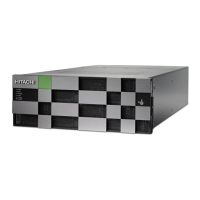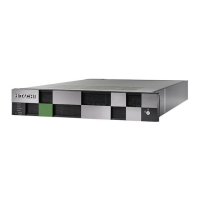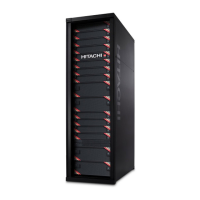Hitachi VSP User and Reference Guide
1–8
Introduction
• High speed disk drives that run at 7,200, 10,000, or 15,000 RPM
• Flash drives with ultra high speed response
• Flash modules with response times faster than SSDs.
• High speed data transfer between the BED and HDDs at a rate of 6 GBps
with the SAS interface
• High speed quad core CPUs that provide three times the performance of
a Universal Storage Platform V/VM storage system.
High capacity
The Virtual Storage Platform supports the following high-capacity features.
See Table 1-2 Drive Specifications on page 1-11, for details.
• HDD (disk) drives with capacities of 146 GB, 300 GB, 600 GB, 900 GB,
2 TB and 3TB.
• Flash drive capacities of 200 GB and 400 GB
• Flash modules with a capacity of 1.6 TB or 3.2 TB each.
• The VSP controls up to 65,280 logical volumes and up to 2,048 disk
drives, and provides a maximum physical disk capacity of approximately
2.521 PB per full storage system.
Connectivity
Virtual Storage Platform
The Virtual Storage Platform storage system supports most major IBM
Mainframe operating systems and Open System operating systems, such as
Microsoft Windows, Oracle Solaris, IBM AIX, Linux, HP-UX, and VMware. For
more complete information on the supported operating systems, go to:
http://www.hds.com/products/interoperability/index.htm
Virtual Storage Platform supports the following host interfaces. They can
mix within the storage system.
• Mainframe: Fibre Channel (FICON)
• Open system: Fibre Channel
Storage Navigator
The required features for the Storage Navigator computer include operating
system, available disk space, screen resolution, CD drive, network
connection, USB port, CPU, memory, browser, Flash, and Java environment.
These features are described in Chapter 1 of the Hitachi Storage Navigator
User Guide.
High reliability
The Virtual Storage Platform storage system includes the following features
that make the system extremely reliable:
